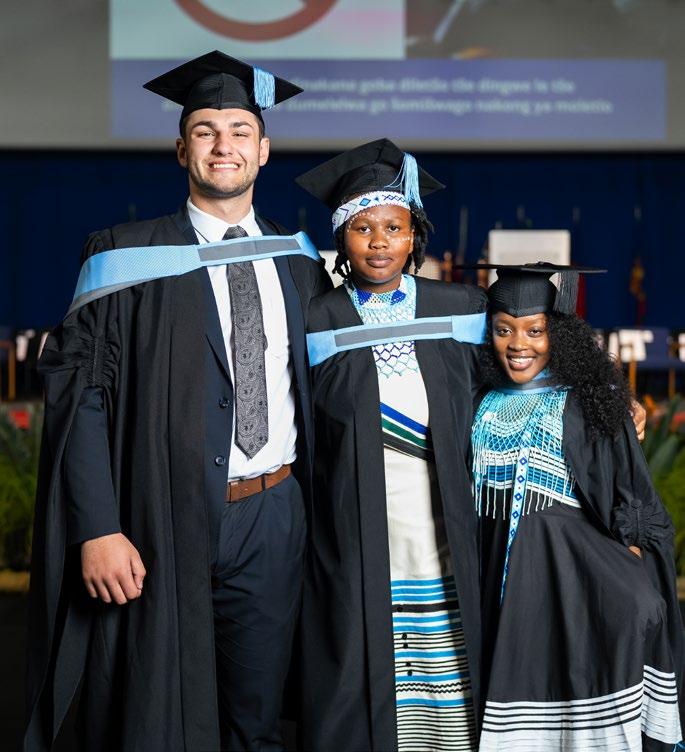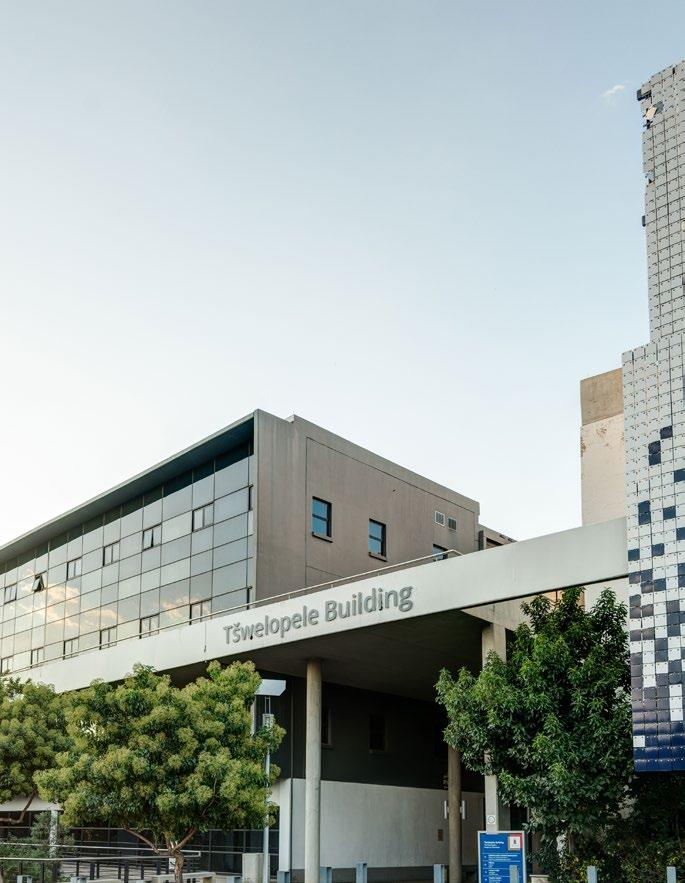2026 FACULTY AT A GLANCE



The University of Pretoria (UP) is one of Africa’s leading research-intensive universities and the largest contact university in South Africa. We produce relevant, socially impactful research to find solutions for the world’s most pressing issues. We believe that in every moment lies the potential to make a positive impact on the future and, in doing so, change the world for the better.
We have a high quality of teaching and learning in the classroom, online and in communities. We have support in place for our students to graduate on time as well-rounded, responsible citizens - fully prepared for the world beyond university. Our degrees are locally accredited and internationally recognised. We have agreements in place with the relevant legal accreditation bodies around the world to ensure the recognition of our academic programmes.

Guided by a vision for global research leadership, our mission is to excel in our core functions of research, teaching and learning — integrating engagement with society and the communities we serve. The University uses the following elements as its navigational markers:



UP’s research and collaborative efforts with its partners are key to transforming the lives of people by providing African solutions to global concerns. UP is rated among the top 1% of universities globally in 14 of the 22 Essential Science Indicator (ESI) fields. Our theme-based approach leverages knowledge fields and research platforms for the greatest impact. Transdisciplinary research projects with the potential to make a real-life difference are strongly encouraged.
Our educational approach has a strong focus on inclusivity and equitable access to education, but ultimately on equity of outcomes. Our committed academics have multiple approaches to teaching to ensure that students with a variety of learning strengths succeed. UP believes that a vibrant student experience encompasses more than successful grades. The University therefore offers a wide range of support services to foster resilient students. We believe our multi-layered support systems play a significant role in student success.
We produce graduates who understand the world of work and can make a valuable contribution to their communities. Our ready-for-work courses help our students to prepare for the workplace, and our entrepreneurship programmes foster the entrepreneurial spirit to encourage innovation.

The FHS has a long and proud tradition of excellence in the education of healthcare professionals. The FHS is driven by cuttingedge research in the creation of teaching and learning in line with the fourth industrial revolution (4IR), in order to graduate a new and future-ready generation of healthcare professionals. Students who join the FHS receive a rich and varied hands-on clinical experience and training in hospital, clinic and community settings, thus becoming a productive part of society and communities alike, with long-term positive impacts.

174
10 postgraduate degree programmes undergraduate degree programmes
SCHOOL OF MEDICINE
SCHOOL OF DENTISTRY
SCHOOL OF HEALTH CARE SCIENCES
SCHOOL OF HEALTH SYSTEMS & PUBLIC HEALTH (POSTGRADUATE)
specialised academic departments
in the world for Life Sciences and Medicine
2025 QS Rankings
in the world for Biological Sciences
2025 QS Rankings
401–450
in the world for Medicine
2025 QS Rankings
in the world for Human Biological Sciences
2024 Shanghai Rankings
501–600
in the world for Medicine and Dentistry
2025 Times Higher Education Rankings
401–600
in the world for Good Health and Wellbeing (SDG 3)
2025 Times Higher Education Rankings
The FHS is recognised nationally and internationally as an outstanding institution for its education of health professionals, its research and its practical handson training of students. It is only by directing our academic efforts towards being problem-oriented that we can accelerate progress in achieving the 2030 Sustainable Development Goals (SDGs). In addressing SDG3: Health and Wellbeing, we support communities through the exceptional talent and dedication of our staff and students involved in projects that uplift health and wellbeing. This provides valuable life skills and training for our students while providing communities with access to an array of healthcare workers.



68%
Academic staff members with a doctorate


52 NRF-rated researchers

6 Research chairs
RESEARCH INSTITUTES
• Institute for Cellular and Molecular Medicine (ICMM)
• UP Institute for Sustainable Malaria Control (UP ISMC)
• Sport, Exercise Medicine and Lifestyle Institute (SEMLI)
• The Pan African Cancer Research Institute (PACRI)
• Nuclear Medicine Research Institute (NuMeRI)
RESEARCH CENTRES
• Centre for Ethics and Philosophy of Health Sciences (CEPHS)
• Centre for Neuroendocrinology (CNE)
• Forensic Anthropology Research Centre (FARC)
• Centre for Viral Zoonoses (UP CVN)
• Centre for Maternal, Fetal, Newborn and Child Health Care (MFNCHC RC)
• UP Diabetes Research Centre (DiabetesCentre@UP)
• Tuberculosis Research Centre (TRC)
• Africa Centre For Tobacco Industry Monitoring and Policy Research
• Brain Tumor and Translational Neurosciences Centre
• Centre for Development and Implementation of Point-Of-Care Diagnostics RESEARCH UNITS
• Environmental Chemical Pollution and Health Research Unit
• Community-orientated Primary Care (UP COPC) Research Unit
Life-Changers Fund: Since its establishment in 2020, the Life Changers Fund has enabled students to reach their full potential by ensuring that students do not go hungry and creating the opportunity for bursaries for those who struggle with tuition fees.
Community Oriented Substance Use Programme (COSUP): This undertaking provides a community-based, low threshold response to the use of drugs, which seeks to reduce harm, and adds to and is integrated with the primary health, HIV and social services of the City of Tshwane.
Informal Settlement Health Research: The project consists of a core ‘roaming’ multi-disciplinary health team offering services with on-site support for community health workers from four informal settlements in/around Pretoria, including Zama Zama, Melusi, Woodlane Village and Cemetery View covering three core areas of care: health across the spectrum, nutrition and education.
The Department of Community Dentistry has initiated numerous community outreach projects with sponsors such as Colgate Palmolive and GlaxoSmithKline. These projects focus on preventing common oral diseases and promoting oral health education.
Nelson Mandela Fidel Castro Medical Student Training Programme: The FHS is one of the institutions that host this programme, which aims to improve human resource workforce capacity and strengthen the healthcare system in South Africa and contribute towards achieving the SDG on health.
Buddy Mentor System: Third-year students apply to be mentors for four to six first-year students in a structured programme of one year.
Tuks Undergraduate Research Forum (TURF): TURF is a platform for UP students to simplify the world of research and facilitate undergraduate research initiatives. TURF prepares its students for the ever-changing modern world of healthcare by providing early exposure to research through mentorship.
The FHS Research Day brings together top researchers and students with opportunity to network and inspire. In 2024 the inaugural event was used to host research workshops, and in 2025 it will be used as a platform to demonstrate top research outcomes from our entities.
Navigating Health Disparities in Vulnerable Communities
• Interventions to Promote Health Care for Vulnerable Populations
• Maternal and Child Health
• Chronic Disease Management
• Paradigm Shift for Patient Care: From Diagnostics to Therapies to Clinical Management
• Response to the Impact of Climate Change on Health

ENQUIRIES
Prospective students: healthapplications@up.ac.za
General enquiries: hscommunications@up.ac.za
www.up.ac.za/faculty-of-health-sciences